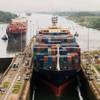Trelleborg Trains USCG on Liqufied GasTransport
Trelleborg’s marine systems operation has again supported the U.S. Coast Guard by delivering a third training session in ensuring the safe, secure and clean transportation and use of liquefied gas in U.S. waters. As liquefied gases become a major commodity across the U.S., there is a critical need for the coast guard community to understand the systems used on board liquefied gas ships and how these work with onshore facilities.
Richard Hepworth, President, Trelleborg Marine Systems, explained, “The liquefied gas industry is now well-established in the U.S, particularly along the Gulf Coast. Understanding how to carry out ship to shore connections for both liquefied gas carriers and fueling operations is essential for all coast guard personnel, from vessel inspectors through to facility examiners.
“This training was led by Andrew Stafford, Technical Director for our SeaTechnik product area, and focused on key safety issues such as emergency shutdown procedures and safety links for both large and small scale fueling applications. As well as familiarizing the U.S. prevention community with the systems used on board liquefied gas ships and how these work with facilities ashore, the session also involved discussion on response and planning.”
Captain Brian Penoyer, U.S. Coast Guard sector commander for Sector Houston-Galvesten, addsed, “It’s critically important that we all understand how this complex, and often unfamiliar, liquefied gas industry can remain safe. Whether a port is seeing new liquefied gas exports, imports or use of liquefied gas as a fuel, the change throughout the maritime community is affecting everything, from traffic management, to planning, to prevention and to response.”
The Trelleborg Marine Systems webinar was sponsored by the Coast Guard’s Liquefied National Gas Carrier National Center of Expertise (LGC NCOE) which focuses on providing industry specific consultation and services to the Coast Guard and maritime industry. In addition to an overview of liquefied gas ship-shore connections, the training looked at emergency shutdown, ship to shore links for large scale applications, universal safety link for small scale fueling applications, quick release hooks, emergency release couplings and other docking and mooring-based equipment.













